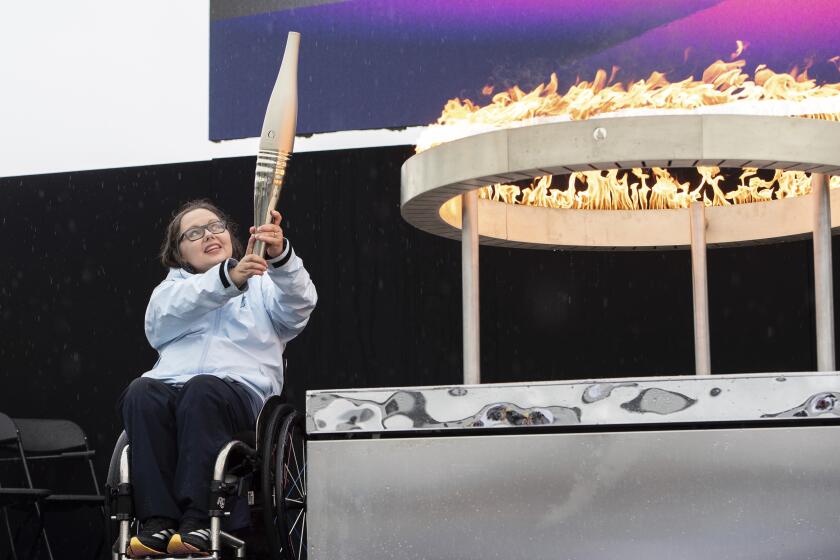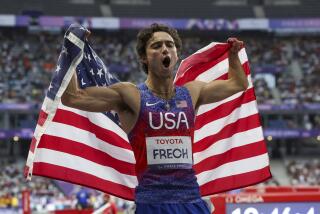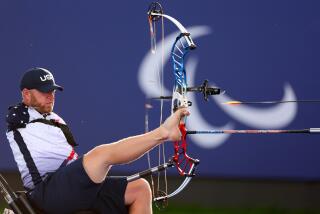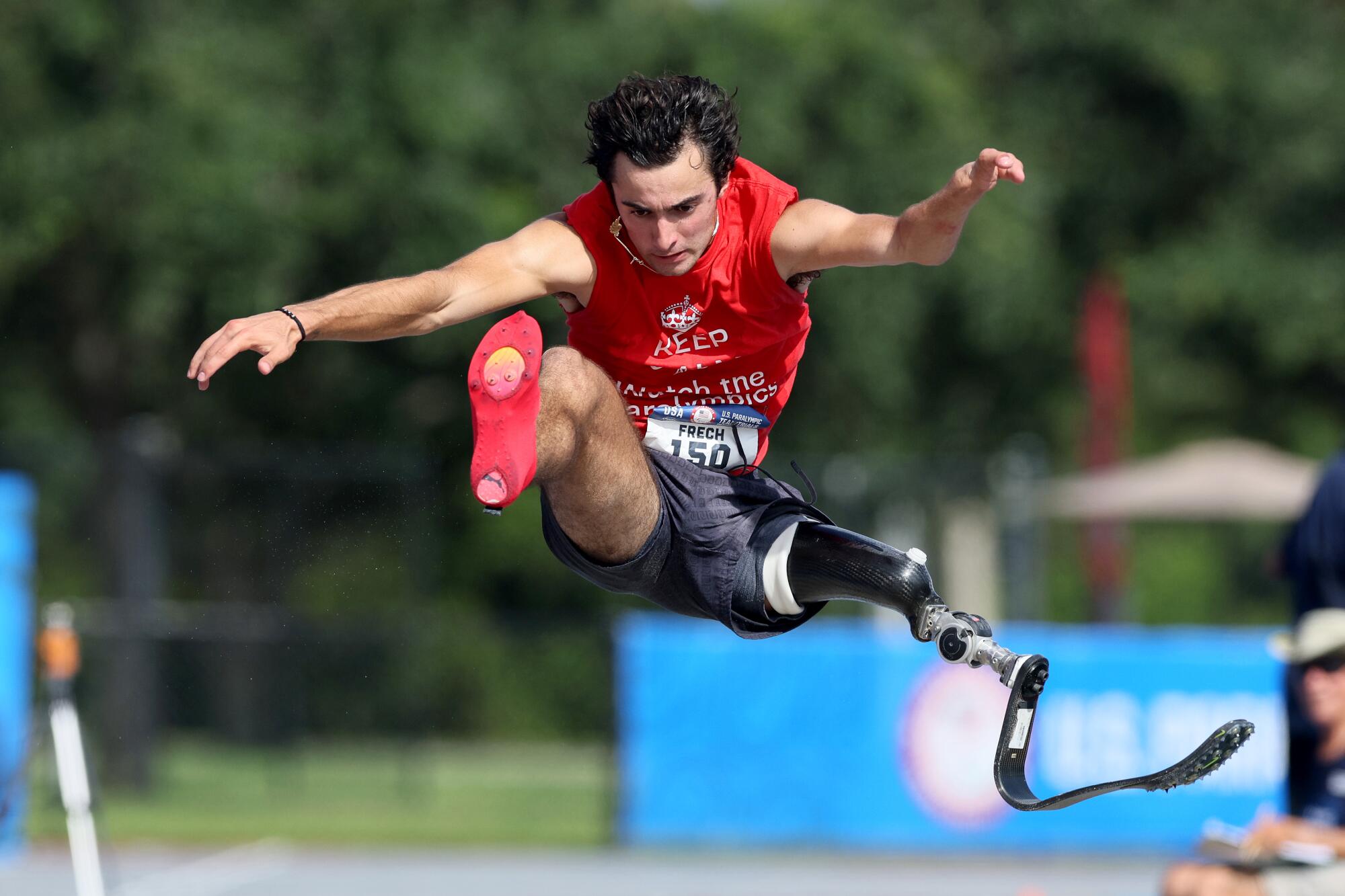
- Share via
Ezra Frech made history, extended his arms wide and flashed a knowing smirk to the cheering crowd. On an NBC interview after he soared to a world-record 1.97-meter high jump at the U.S. Paralympic trials, the budding superstar nonchalantly called it “all a part of the plan.”
And this plan is only getting started.
Frech won’t settle for just winning his first Paralympic medals while breaking the limits on disability. The favorite for the high jump title in Paris, who also competes in long jump and the 100 meters, is headed next to USC, where he was the first above-the-knee amputee to commit to a Division I track program. He also struts on fashion runways with his prosthetic left leg, graces billboards in a running blade and shares everything on his social media channels that have more than half a million followers.
“I feel I have the beautiful burden to share my story and inspire the next generation because this community means the world to me,” said Frech, 19. “What I literally believe I was put on this planet to do is to normalize disability.”
The Paris Paralympics flame has been lit in the British village of Stoke Mandeville, widely considered the birthplace of the Paralympic Games.
To Frech, the stakes are much higher than just his own achievements. He recites what is at risk.
Children born with physical disabilities are abandoned by their parents all over the world.
Kids with disabilities are bullied at much higher rates than their peers.
Frech, who was born with congenital limb differences that left him without a knee or fibula in his left leg and without fingers on his left hand, felt like he was stared at everywhere he went growing up in L.A., and that people whispered or mocked under their breath. When he played sports, he almost always was the only one with a physical disability.
But his parents, Clayton and Bahar, ensured he had a community in adaptive sports. The family attended its first adaptive sports event when Frech was just 5 months old. Actor and family friend John Siciliano, a 1996 Paralympian, taught Frech to run at 4 years old. When he attended his first Paralympic-style event with his father at 8, Frech became completely enamored with track and left the event in Oklahoma inspired to bring the same opportunity to L.A.
Frech’s family and friends founded Angel City Sports in 2013. The nonprofit provides year-round adaptive sports clinics, classes and competitions for kids, adults and veterans with physical disabilities. Angel City Sports provides free equipment and coaching and organizes the Angel City Games, the largest Paralympic-style adaptive sports event in the West.
Frech wants to give back to the adaptive sports community the same way it has given to him, even if it means the Brentwood High graduate will step outside it to compete at USC.
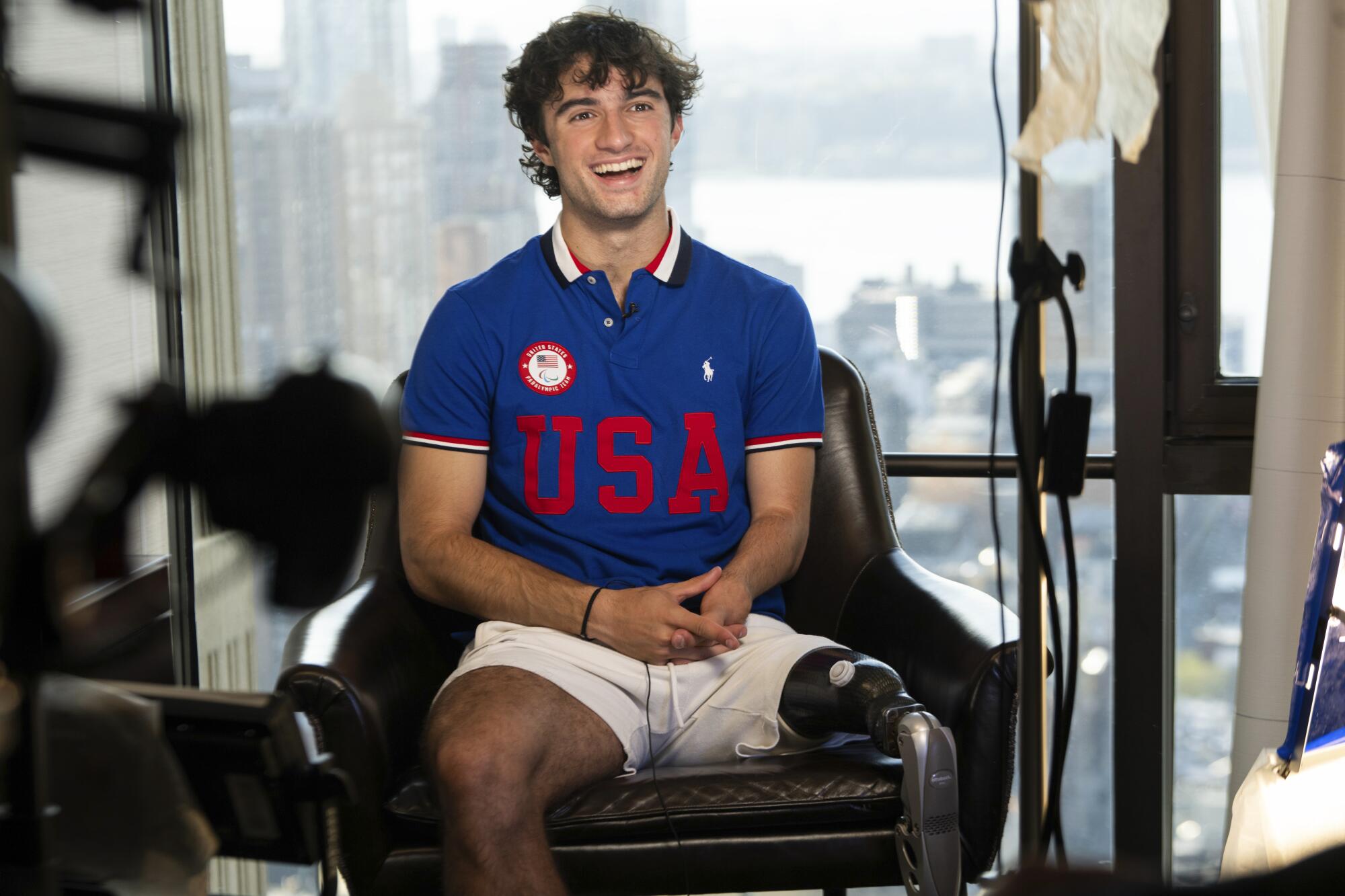
“It’s a different type of honor for me,” Frech said of competing against able-bodied athletes in college, “because I know it’s going to change perceptions.”
With everything else he’s advocating for, naysayers who type anonymous social media comments about how he won’t live up to the hype of his historic commitment to USC are the smallest of his concerns. Instead of proving critics wrong, he will walk onto campus hoping to prove the people who believed in him right.
“I am excited to compete with the USC track team. But I’m equally as excited for the world to just watch it and go, ‘What is going on? How is this possible?’” Frech said. “For the little kid who’s an amputee who loves track and field to go see someone who looks like him competing at a collegiate level against able-bodied athletes the same way he hopes to compete against his peers in school.”
Of the United States’ 255 Paris Paralympians, 70 are former, current or incoming NCAA varsity athletes who competed against able-bodied peers. More than half of the U.S. delegation competed at NCAA Divisions I, II and III, junior college, NAIA or collegiate club programs.
At USC, Frech will join fellow 2021 Paralympian Dallas Wise, who placed second in the high jump and triple jump at the Pac-12 championships last year before earning a bronze medal at the 2023 world championships in the T46/47 high jump, a category for athletes with a single-arm impairment.
USC assistant coach Jeff Petersmeyer works with two other members of the U.S. Paralympic team, led by three-time Paralympic gold medalist Roderick Townsend. The high jump world record holder for the T47 category is Frech’s personal coach and introduced Petersmeyer to the young star around 2017.
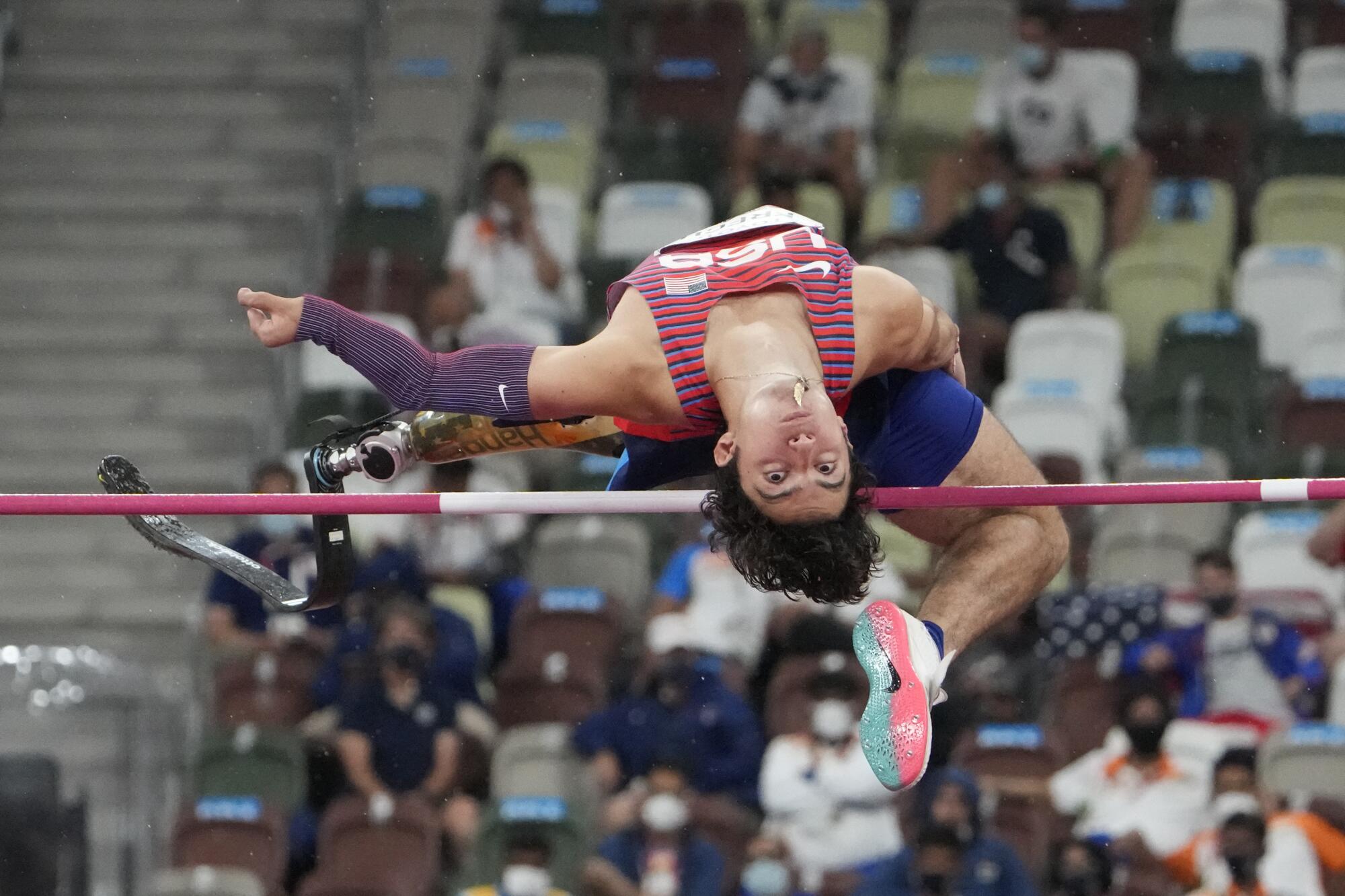
He was just “a little guy back then,” Petersmeyer said, but now entering his second Paralympics, Frech is the “most mature freshman I’ll have in my 27 years of coaching.”
“He’s just a great person,” Petersmeyer said, “and he’s going to bring to the team a very unrivaled work ethic and a maturity that I think is really going to help everybody that’s around him.”
Frech realizes it’ll be a challenge to score for the Trojans, whose men’s team is coming off a third-place finish at the NCAA outdoor championships, its best since 2003. Petersmeyer said Frech has the potential to score for the Trojans in a conference championship meet or against UCLA in a dual meet. Frech’s T63 American record long jump of 7.05 meters (23 feet 1½ inches) achieved in the U.S. Paralympic trials — T63 is the category for single-leg, above-the-knee amputees who compete with a prosthetic — would have placed him 13th in last year’s Pac-12 championships. His T63 world-record high jump mark of 1.97 meters (6 feet 5½ inches) would have narrowly missed scoring position at 10th.
But doubt him at your own peril. Frech already has made a habit of surpassing expectations.
Frech grew up competing in soccer, baseball and basketball with able-bodied peers, but found his calling on the track while watching the 2016 Paralympics. At 11, he promised to compete at the Tokyo Olympics. At 16, he was the United States’ second-youngest athlete in the Tokyo Paralympic Games, where he matched a personal best in the high jump despite competing during a rainstorm.
Instead of basking in the glory, Frech calls it “undoubtedly one of the most devastating moments of my entire life.” He finished fifth, missing the podium by three centimeters.
Frech stalked around the arena. He imprinted how the rain felt as it bled through his uniform. The sight of the empty stands. The envious feeling watching his competitors celebrate, posing together in the traditional manner with their national flags held above their heads.
He saved a photo of the medalists celebrating as the lock screen of his phone.
“It felt like the origin story for the hero or the villain,” Frech said.
The corrupt IOC is taking a stand against sportsmanship, integrity and the Olympic spirit if it continues to demand Jordan Chiles return her medal.
Articulate, charismatic and based in the host city of the next Paralympic Games, Frech has positioned himself to be the pied piper of the Paralympic movement for years. He avenged the disappointing Tokyo result by winning his first world high jump championship last year. When he got upset in this year’s world championships and finished with a silver medal, Frech answered by resetting the world record at the U.S. Paralympic trials in July.
He popped straight off the high jump mat after clearing the 1.97-meter bar and jumped into Townsend’s arms. He faced the camera and waved his hands in front of his chest to highlight the black text on the front of his white shirt.
“Day 56/100,” the shirt read, “until I win gold.” A black piece of tape covered the word “Paralympic.”
Frech spent the summer counting the day until his Paralympic podium chance, sharing daily videos on his social media channels. But he can’t quantify the anticipation for his ultimate goal.
“I would trade in every medal, every world record, every national championship title,” Frech said, “if it meant I could normalize disability in the process.”
More to Read
Go beyond the scoreboard
Get the latest on L.A.'s teams in the daily Sports Report newsletter.
You may occasionally receive promotional content from the Los Angeles Times.

